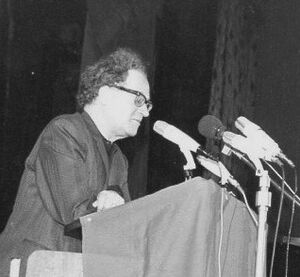Bernard Delfgaauw facts for kids
Quick facts for kids
Bernard Delfgaauw
|
|
|---|---|

Delfgaauw in 1975
|
|
| Born | 24 November 1912 |
| Died | 20 August 1993 (aged 80) |
| Era | 20th-century |
| Region | Western philosophy |
| School | Neo-Thomism |
Bernardus Maria Ignatius "Bernard" Delfgaauw (born November 24, 1912 – died August 20, 1993) was a Dutch philosopher. A philosopher is someone who studies big questions about life, knowledge, values, and how we should live.
Bernard Delfgaauw was known for his many writings and for teaching philosophy at a university. He helped many people understand complex ideas through his popular books.
Contents
Who Was Bernard Delfgaauw?
Bernard Delfgaauw was born in the Netherlands in 1912. He grew up to become a very important thinker and teacher. He passed away in 1993 when he was 80 years old.
A Life of Learning
Bernard Delfgaauw studied the Dutch language and philosophy at the University of Amsterdam. In 1947, he earned his highest degree, a doctoral degree, after studying the ideas of a French thinker named Louis Lavelle.
Later, in 1961, he became a professor of philosophy at the University of Groningen. This meant he taught students about philosophical ideas and did his own research.
A Popular Writer
Delfgaauw wrote many books and articles on different topics. He explored ideas like existentialism (which is about human existence and freedom) and the thoughts of famous philosophers like Thomas Aquinas and Immanuel Kant. He also wrote about evolution and how we use language.
One of his most famous books was a short history of philosophy. It was so popular that it was printed many times and translated into several languages. This book helped many people learn about the history of big ideas.
Speaking Up for Peace
Bernard Delfgaauw was not afraid to speak his mind, especially when he believed something was wrong. During the Vietnam War, it was against the rules in the Netherlands to say that President Lyndon B. Johnson was a "killer."
In 1967, Delfgaauw spoke at a meeting. He said that, based on rules used in past international trials, President Johnson and his team were responsible for serious actions during the war. After he said this, students protesting the war changed their slogan from "Johnson Killer" to "Johnson Miller." This showed how his words had an impact on public opinion and encouraged people to think critically.
See also
 In Spanish: Bernard Delfgaauw para niños
In Spanish: Bernard Delfgaauw para niños
 | Tommie Smith |
 | Simone Manuel |
 | Shani Davis |
 | Simone Biles |
 | Alice Coachman |

